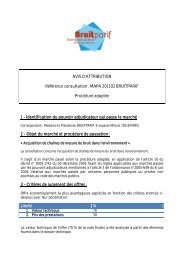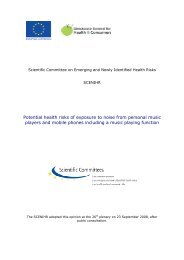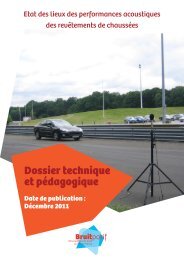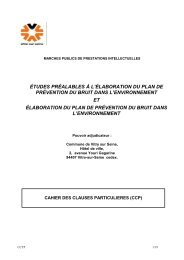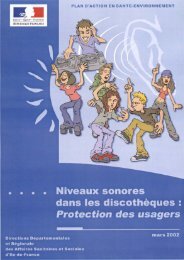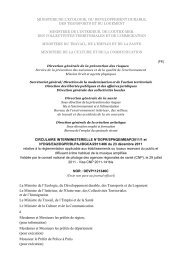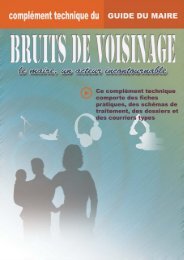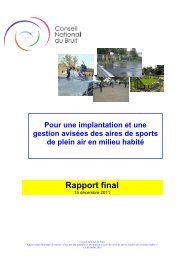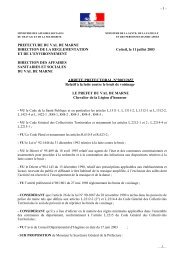Night noise guidelines for Europe - WHO/Europe - World Health ...
Night noise guidelines for Europe - WHO/Europe - World Health ...
Night noise guidelines for Europe - WHO/Europe - World Health ...
You also want an ePaper? Increase the reach of your titles
YUMPU automatically turns print PDFs into web optimized ePapers that Google loves.
28<br />
SLEEP AND HEALTH<br />
Early reports documented that untreated OSAS can have long-term negative effects, such<br />
as failure to thrive, cor pulmonale and mental retardation. These severe consequences are<br />
less common now due to early diagnosis and treatment, but recent reports have focused<br />
on other long-term effects mainly related to neurocognitive deficits, such as poor learning,<br />
behavioural problems and ADHD (Marcus, 2001).<br />
Gozal and Pope (2001) tried to determine the potential long-term impact of early childhood<br />
snoring. Analysing questionnaires of 797 children in a low academic per<strong>for</strong>mance<br />
group (LP) and 791 in a high academic per<strong>for</strong>mance (HP) group, they found that frequent<br />
and loud snoring during early childhood was reported in 103 LP children (12.9%)<br />
compared with 40 HP children (5.1%). There<strong>for</strong>e, children with lower academic per<strong>for</strong>mance<br />
in middle school are more likely to have snored during early childhood and to<br />
require surgery <strong>for</strong> snoring compared with better per<strong>for</strong>ming schoolmates. These findings<br />
suggest that children who experienced sleep-disordered breathing during a period<br />
traditionally associated with major brain growth and substantial acquisition of cognitive<br />
and intellectual capabilities may suffer from a partially irreversible compromise of their<br />
a priori potential <strong>for</strong> academic achievement. Three major components that result from<br />
the intermittent upper airway obstruction that occurs during sleep in children could theoretically<br />
contribute to such neurocognitive deficits, namely episodic hypoxia, repeated<br />
arousal leading to sleep fragmentation and sleep deprivation, and periodic or continuous<br />
alveolar hypoventilation.<br />
Schooling problems may underlie more extensive behavioural disturbances such as restlessness,<br />
aggressive behaviour, EDS and poor neurocognitive test per<strong>for</strong>mances. Nearly<br />
20–30% of children affected by OSAS or loud and frequent snoring show important<br />
signs of behavioural problems such as inattention and hyperactivity. Problems similar to<br />
symptoms of ADHD are linked to the presence of repeated sleep arousals, and intermittent<br />
hypoxic events, inducing a lack of behavioural inhibition with negative implications<br />
<strong>for</strong> working memory, motor control and self-regulation of motivation and affect.<br />
In contrast with these data, Engle-Friedman et al. (2003) recently found a significant<br />
improvement of functions, at least in mild to moderate OSAS, when measured several<br />
months following an adenotonsillectomy, but they confirmed that their results could not<br />
rule out the possibility, even after treatment, of partial irreversible damage to academic<br />
function that may be detected only later in life. In addition, they stated that adults who<br />
also had deficits of neurocognitive executive functions related to the prefrontal area<br />
failed to improve significantly after treatment.<br />
The negative long-term effects may be mediated by the irreversible alteration of the prefrontal<br />
cortex (PFC) and be related to structural changes of the brain as a consequence<br />
of both hypoxaemia and sleep fragmentation induced by OSAS or other pathologies<br />
affecting sleep.<br />
In a recent report concerning OSAS adults, Macey et al. (2002) demonstrated grey matter<br />
loss in cerebral sites involved in motor regulation of the upper airway as well as in<br />
areas contributing to cognitive function (frontal and parietal cortex, temporal lobe, anterior<br />
cingulate, hippocampus and cerebellum). It can be argued that, in critical stages of<br />
brain development (that is, in childhood), these effects can lead to even more severe consequences,<br />
which could explain the negative long-term effects.<br />
It is speculative to think that the remodelling of the brain could also be mediated by sleep<br />
and, there<strong>for</strong>e, sleep fragmentation could affect the process of brain plasticity (that is, the<br />
capacity of the brain to modify its structure and function over time). Recent studies show-<br />
NIGHT NOISE GUIDELINES FOR EUROPE



